Installing an aftermarket exhaust can lead to legal issues if it doesn’t meet local noise, emissions, and certification rules. You might face fines, vehicle impoundment, or trouble registering your vehicle if it violates regulations. Laws vary widely across regions, so it’s crucial to verify your exhaust’s compliance before installation. Staying informed helps avoid penalties and insurance problems. Continue exploring to guarantee your exhaust stays on the right side of the law.
Key Takeaways
- Aftermarket exhausts must comply with local noise and emission regulations to avoid fines and vehicle impoundment.
- Certification and approval processes ensure exhaust systems meet legal standards before installation.
- Non-compliant exhaust modifications can lead to registration issues and inspection failures.
- Violations of noise and emission laws may result in hefty fines, license suspension, or criminal charges.
- Proper documentation and proof of compliance are essential for legal protection and insurance claims.
Understanding Local Sound Regulations and Noise Limits
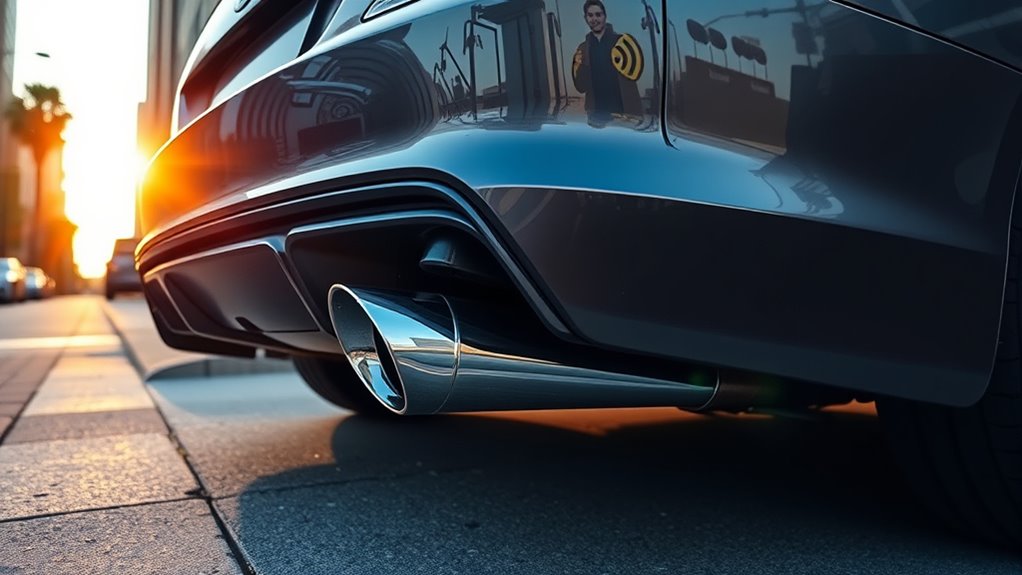
To stay compliant with local laws, you need to understand the specific sound regulations and noise limits in your area. Start by researching your city or state’s noise ordinances, which often specify maximum decibel levels for vehicle exhausts. These limits vary widely depending on location, time of day, and vehicle type. Keep in mind that some zones, like residential neighborhoods, typically have stricter limits than commercial or industrial areas. You might also find restrictions on noise duration or frequency. It’s essential to check whether your aftermarket exhaust is compliant before installation. Ignoring these regulations can lead to fines, vehicle inspections, or even mandatory removal of the exhaust system. Staying informed helps you avoid legal trouble and keeps your vehicle within the bounds of local noise laws. Understanding industry trends can also help you anticipate changes in regulations and ensure ongoing compliance. Additionally, being aware of local enforcement practices can help you better understand how these laws are applied in your community. Monitoring sound measurement techniques can further assist in verifying compliance with noise limits. Being familiar with noise control technology can also aid in modifying or adjusting your exhaust to meet legal standards.
Emission Standards and Environmental Compliance
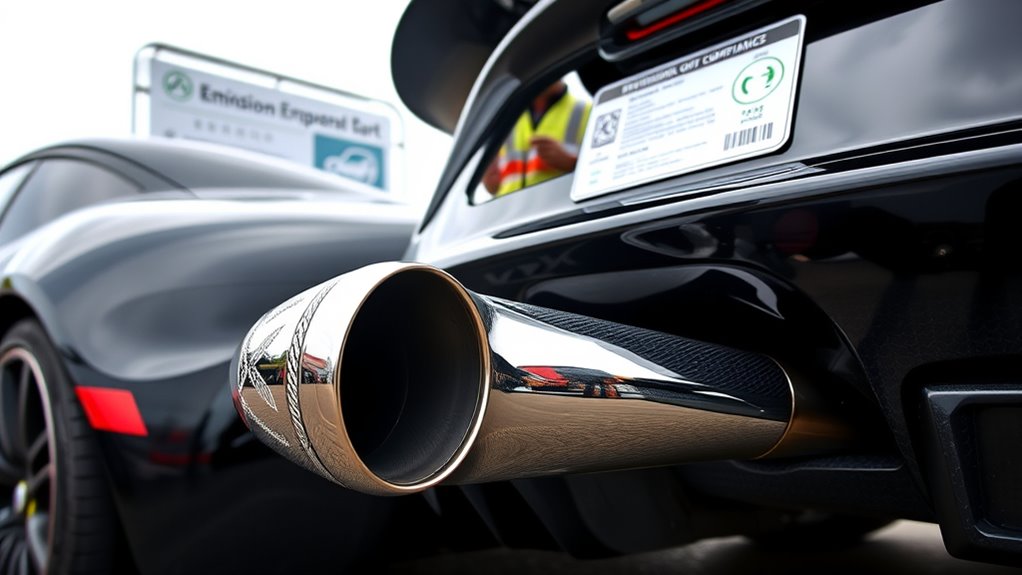
Are your aftermarket exhaust modifications compliant with emission standards and environmental regulations? If not, you risk fines, vehicle impoundment, or being compelled to revert to stock parts. Authorities enforce strict limits on pollutants like NOx, CO, and hydrocarbons, which aftermarket exhausts can sometimes increase if not properly designed. Installing an exhaust system that bypasses catalytic converters or muffles emissions can lead to legal trouble. To stay compliant, verify that your modifications adhere to local emission laws, use certified components, and avoid alterations that increase harmful emissions beyond permitted levels. Staying within regulations protects both the environment and your legal standing. Regular maintenance and adherence to air quality standards help ensure your vehicle remains compliant with environmental laws. Understanding sound design principles can also assist in creating compliant exhaust sounds that do not misrepresent emissions levels. Additionally, being aware of emission testing procedures is crucial for ensuring your vehicle passes inspections and remains legally operable. Moreover, understanding emission standards set by regulatory agencies can guide you in selecting compliant aftermarket parts and modifications. Incorporating innovative emission control technologies can further enhance your vehicle’s compliance and reduce environmental impact.
Mandatory Certification and Approval Processes

You need to understand the certification requirements to guarantee your aftermarket exhaust complies with legal standards. The approval process involves specific procedures that verify the exhaust’s safety and environmental impact. Additionally, understanding building codes and zoning regulations related to vehicle modifications can help ensure your exhaust installation is compliant. Knowing these steps helps you avoid penalties and legal issues down the line. It is also important to stay informed about self-certification options, which may streamline the approval process for certain exhaust systems. Familiarity with personality traits can be beneficial in understanding how different individuals might approach compliance and safety considerations in modification practices. Recognizing the significance of spiritual symbols in various cultural contexts can also provide a broader perspective on respecting diverse regulations and practices. Moreover, awareness of auditory processing aspects can be useful when considering the auditory environment and noise levels associated with aftermarket exhausts.
Certification Requirements Overview
Guiding the certification process for aftermarket exhausts is essential to guarantee compliance with legal standards. You need to understand that most regions require exhaust systems to meet specific emissions and noise regulations before they’re sold or installed. Certification often involves testing to verify that the exhaust reduces emissions within permissible limits and doesn’t produce excessive noise. You’ll typically submit documentation and test results to relevant authorities, such as environmental agencies or transportation departments. Some areas require the exhaust to carry official labels or approval marks indicating compliance. Ensuring your aftermarket exhaust meets these certification requirements helps you avoid legal penalties, fines, or the need to remove non-compliant parts. Staying informed about certification standards is *vital* for lawful installation and use of aftermarket exhaust systems. Additionally, being aware of regulatory compliance requirements ensures that you adhere to all legal obligations and avoid potential liabilities. Monitoring ongoing updates to payment processing regulations can also help manufacturers and retailers stay compliant with evolving standards. Proper documentation and adherence to emission standards are crucial in maintaining legal conformity in various jurisdictions. Regularly reviewing certification procedures can help ensure your products remain compliant as standards change over time. Moreover, understanding the testing procedures involved can streamline the certification process and prevent costly delays.
Approval Process Procedures
Finding your way through the approval process for aftermarket exhausts involves completing mandatory certification steps to make certain of compliance with legal standards. First, you need to submit your exhaust system for testing at authorized testing facilities. They evaluate noise levels, emissions, and overall safety according to regional regulations. Once your exhaust passes, you’ll receive official certification, which confirms it meets legal requirements. Next, you must submit documentation to relevant authorities, including test results and manufacturer details. Some regions also require registering the exhaust system before installation. If your exhaust doesn’t meet standards, you may need to modify it or seek special approval. Following these procedures guarantees your exhaust is legal, reducing the risk of fines or vehicle confiscation. Additionally, understanding the Vetted standards for portable camping gear can help ensure your modifications are compliant with regional safety and environmental regulations. Moreover, staying informed about keto diet tracking practices can assist in maintaining compliance with regional vehicle modification laws that prioritize safety and environmental impact. It is also advisable to consult with professionals familiar with vehicle modification regulations to ensure all legal requirements are thoroughly met. Being aware of popular juice brands and their health benefits can also aid in understanding consumer preferences and the market landscape related to vehicle modifications. Furthermore, familiarizing yourself with the differences between various certification processes can streamline your approval journey and prevent unnecessary delays.
Impacts of Non-Compliance on Vehicle Registration
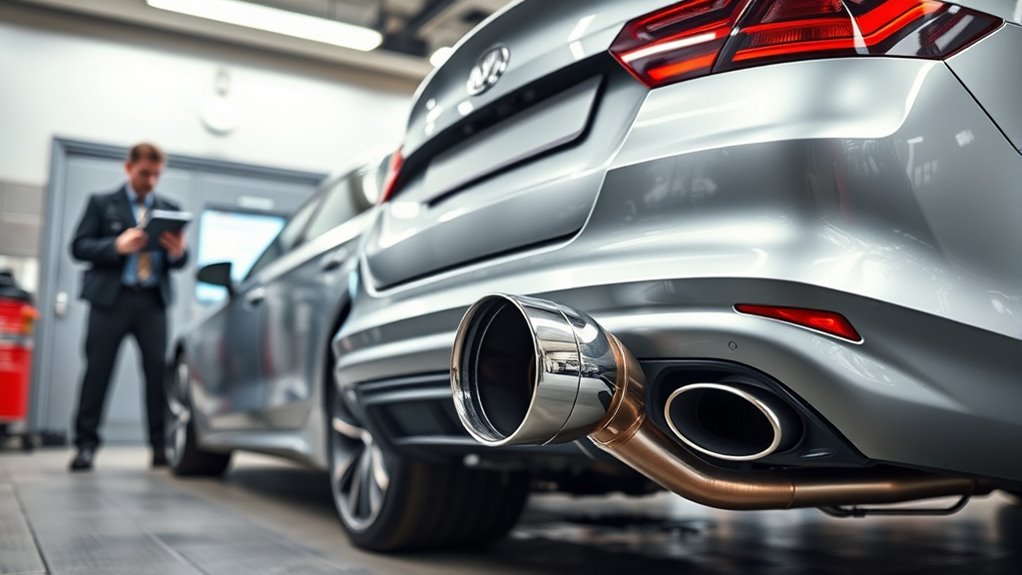
If your vehicle doesn’t meet exhaust regulations, you risk having your registration denied. This non-compliance can lead to legal penalties and make future inspections more difficult. Staying within the law helps guarantee your vehicle remains properly registered and roadworthy. Additionally, understanding airless paint sprayers can help you identify legal modifications that do not compromise your vehicle’s compliance.
Registration Denial Risks
Have you considered how installing an aftermarket exhaust without proper compliance can lead to your vehicle being denied registration? When authorities find your exhaust doesn’t meet legal standards, they may refuse to register your vehicle until you make necessary adjustments.
This can cause delays and extra costs, leaving you unable to drive legally. Non-compliance might result in:
- Your vehicle failing inspection due to noise violations
- Rejection of registration application at the DMV
- Additional fines or penalties until compliance is achieved
Ignoring the rules can also mean your vehicle remains unregistered, risking legal trouble and potential impoundment.
To avoid these registration risks, ensure your exhaust system aligns with local noise and emission standards before installation. Staying compliant protects your legal driving privileges and saves you time and money.
Legal Penalties Increase
Failing to guarantee your aftermarket exhaust complies with legal standards can lead to serious penalties that affect your vehicle registration status. Authorities may impose fines, revoke registration, or require you to revert to a compliant exhaust system. These penalties can increase if non-compliance persists, impacting your ability to drive legally. Below is a breakdown of potential penalties:
| Penalty Type | Consequences |
|---|---|
| Fines | Monetary penalties that vary by jurisdiction |
| Registration Suspension | Temporarily or permanently revoked registration |
| Vehicle Impoundment | Your vehicle can be seized until compliance |
| Legal Action | Court penalties or citations |
| Increased Insurance Rates | Higher premiums due to violations |
Remaining non-compliant risks your registration and finances, making adherence essential.
Inspection Failures Likelihood
Non-compliance with aftermarket exhaust regulations considerably increases the risk of inspection failures during routine vehicle checks.
If your exhaust doesn’t meet legal standards, inspectors are more likely to flag your vehicle, resulting in delays or fines. These failures often lead to vehicle registration issues, as authorities require compliance for renewal.
To avoid this, ensure your exhaust system:
- Meets noise and emission standards set by local regulations
- Has proper documentation or certification if necessary
- Passes visual and functional inspection criteria
Failing an inspection means you might need costly modifications or repairs before your vehicle can be registered again.
Staying compliant reduces your chances of inspection failure, saving you time, money, and registration headaches. Being proactive about regulations helps keep your vehicle legally on the road.
Penalties for Illegal Exhaust Modifications

If you modify your exhaust system illegally, you risk facing significant penalties that can affect your driving privileges and finances. Law enforcement agencies may issue fines, which vary by jurisdiction but can be substantial.
In some areas, illegal exhaust modifications can lead to vehicle impoundment or suspension of your driver’s license. Repeated violations might also result in higher fines or even criminal charges, especially if the modification causes excessive noise or pollution.
Insurance companies could increase your premiums or deny coverage if they discover illegal modifications after an accident. Additionally, you might be required to revert your exhaust to stock condition, incurring repair costs.
Differences in Laws Across States and Countries
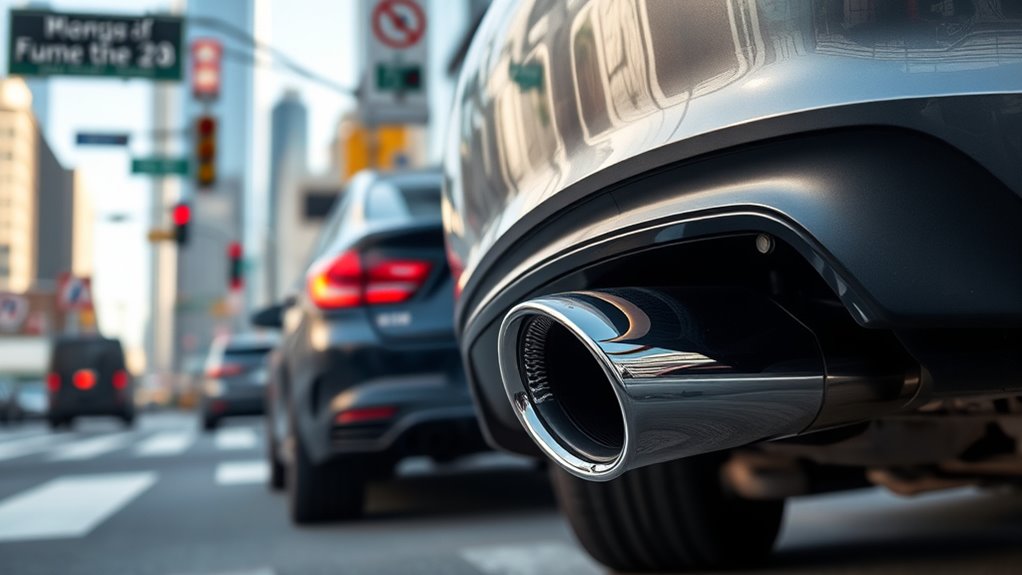
Laws governing aftermarket exhaust modifications vary considerably across states and countries, making it essential for vehicle owners to understand the specific regulations in their area. Some regions have strict noise limits, while others focus on emissions compliance.
You might find that:
- Certain states ban modifications that exceed specific decibel levels.
- Some countries require aftermarket parts to be certified or tested.
- Enforcement varies, with some places conducting regular inspections and others relying on complaints.
Because regulations differ so widely, it’s vital to research local laws before installing an aftermarket exhaust. Ignorance can lead to fines, citations, or vehicle impoundment.
Staying informed helps you avoid legal trouble and ensures your vehicle remains compliant with regional standards.
How to Verify if an Exhaust System Is Legal

To guarantee your aftermarket exhaust system is legal, start by researching the specific regulations in your area. Check local, state, or national laws that specify noise limits, emissions standards, and approved modifications.
Visit government websites or contact relevant agencies to find official documentation. Look for certifications, labels, or stamps on the exhaust that indicate compliance with legal standards.
Consult your vehicle’s manual or manufacturer’s guidelines to see if aftermarket parts are approved. Additionally, talk to authorized dealers or mechanics familiar with local laws—they can help verify if a particular exhaust system is compliant.
Tips for Staying Within Legal Boundaries

Staying within legal boundaries when installing aftermarket exhausts requires proactive steps. First, always check your local noise and emissions laws before making modifications.
Second, consult your vehicle’s manufacturer guidelines to ensure compatibility.
Third, research certified or approved exhaust brands known for legal compliance.
To stay compliant, consider these tips:
- Regularly verify if your exhaust system meets current regulations
- Keep documentation of purchase and compliance certificates
- Schedule periodic inspections to ensure your exhaust remains within legal limits
Navigating Insurance and Liability Concerns
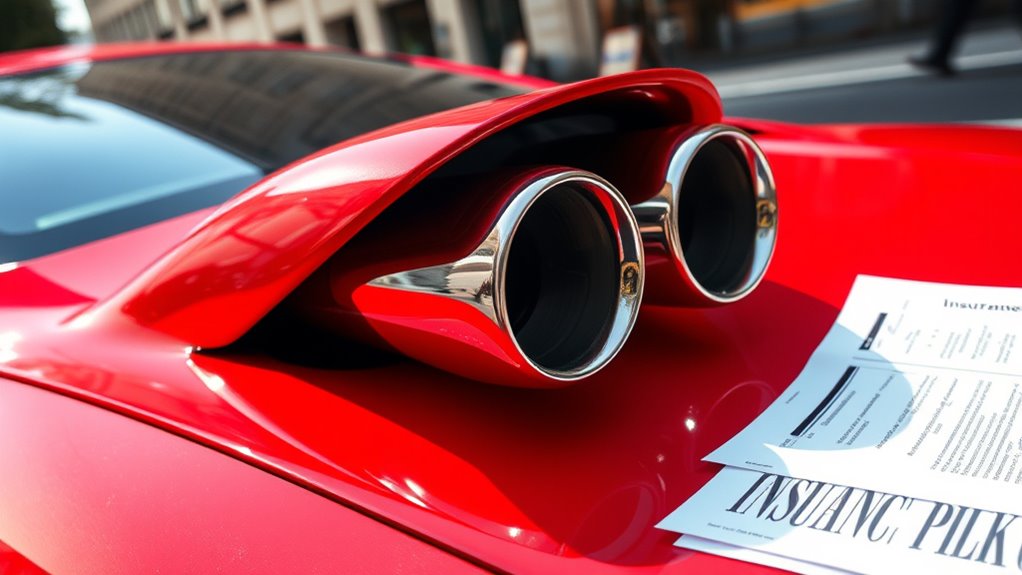
Managing insurance and liability concerns is essential when installing aftermarket exhausts, as these modifications can impact your coverage and legal responsibilities. Before making changes, check with your insurer to see if aftermarket exhausts are covered or if you’ll need to inform them. Failure to disclose modifications could result in denied claims or policy cancellations if an accident occurs.
Keep detailed records of your installation and any professional inspections to prove compliance. Understand that some exhausts may violate noise or emissions laws, increasing the risk of fines or liability in accidents. If your exhaust causes damage or injury, you could be held liable, especially if it’s illegal or improperly installed.
Staying informed helps protect your coverage and limits your legal exposure.
Frequently Asked Questions
Can Aftermarket Exhausts Void My Vehicle’S Warranty?
You’re wondering if installing an aftermarket exhaust will void your vehicle’s warranty. It depends on your manufacturer’s policies and local laws.
Generally, if the aftermarket exhaust causes damage or isn’t installed correctly, the warranty could be affected. However, many manufacturers won’t void your entire warranty just for installing one, especially if you can prove the part isn’t related to the defect.
Always check your warranty terms before making modifications.
Are There Specific Penalties for Installing a Non-Compliant Exhaust System?
You might think penalties only apply if you’re caught, but installing a non-compliant exhaust system can lead to fines or vehicle impoundment. Authorities regularly conduct inspections, especially during emissions testing or traffic stops.
If your exhaust doesn’t meet noise or emissions standards, you risk penalties, including hefty fines and mandated repairs. Staying compliant helps avoid legal trouble and keeps your vehicle street-legal, ensuring you’re not caught off guard by enforcement actions.
How Do I Document Compliance When Installing an Aftermarket Exhaust?
When installing an aftermarket exhaust, you need to document compliance by keeping all receipts and installation records, including any certifications or approvals from the manufacturer.
Take photos of the exhaust installed on your vehicle, and if possible, obtain a compliance certificate or statement from the manufacturer.
These documents prove you followed legal requirements, making it easier to show that your exhaust system meets noise and emissions standards if needed.
Do Aftermarket Exhausts Affect Vehicle Resale Value Legally?
Imagine your car’s resale value as a delicate balance scale. When you install an aftermarket exhaust, it can tip the scale either way—appealing to enthusiasts but possibly deterring traditional buyers.
Legally, if the exhaust meets local noise and emission laws, it shouldn’t harm your resale value. However, incomplete documentation or non-compliance might raise red flags, making your vehicle less attractive or harder to sell legally.
Are There Federal Laws Governing Aftermarket Exhaust Modifications?
You should know that federal laws do regulate aftermarket exhaust modifications. The Environmental Protection Agency (EPA) sets standards to limit vehicle emissions, so if your exhaust isn’t compliant, you could face fines or penalties.
Additionally, the Department of Transportation (DOT) enforces regulations on noise levels. Before installing an aftermarket exhaust, check local and federal laws to guarantee your modifications are legal and won’t cause issues during inspections or roadside checks.
Conclusion
Exploring the road of aftermarket exhausts is like walking a tightrope over a bustling city at night—one misstep can lead to costly fines or failed inspections. By understanding local laws and verifying your exhaust’s legality, you keep your vehicle’s roar within safe boundaries. Stay informed, stay compliant, and enjoy the thrill of your ride without the shadow of penalties lurking behind you. Your journey is smoother when you steer clear of illegal modifications.









